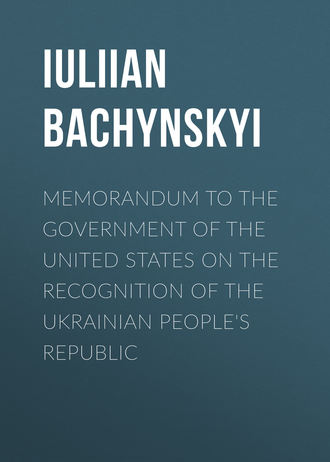 полная версия
полная версияMemorandum to the Government of the United States on the Recognition of the Ukrainian People's Republic
It is noteworthy that the Government of the Ukrainian People's Republic, headed by General Petlura, which I have the honor to represent, is the only government which the Ukrainian people have been willing to support. On the other hand, they have revolted against all foreign invaders who have attempted to impose their own rule upon the Ukrainians. The Germans, the Bolsheviki and the forces of General Denikin all met with vigorous resistance. If now the Polish forces are in Ukraine and the population does not oppose them, it is because the Poles are acting in conjunction with the Ukrainian forces under Petlura, as their allies.
It is also necessary to consider the opinion entertained in some circles that an independent Ukraine must inevitably fall under the influence of Germany and become a German outpost in eastern Europe. The reason generally advanced as a basis for this suspicion is that Ukraine concluded a separate peace with Germany in February, 1918, at Brest Litovsk. In this connection, it should be remembered that Roumania, too, concluded a separate peace with Germany. Yet Roumania has continued to be considered an ally of Germany's opponents, and it is everywhere recognized that she only negotiated with Germany because of the bitter fact that she was forced to do so. Ukraine was in far worse condition than Roumania when she concluded her peace with Germany. Roumania had at least an organized state and a loyal army. Ukraine's government was in its infancy, its state organization was slight, and its army consisted chiefly of the remnants of the demoralized Russian forces. The Ukrainian leaders were faced by several wars; on the one hand by the war with Germany, Austria-Hungary, Turkey and Bulgaria; and now on the other, by the new conflict with the Russian Soviet Government. Under the circumstances, Ukraine had to choose between submitting entirely to the Bolsheviki, in which case the country would be over-run by Germans anyway, or making any kind of outright peace with Germany and then hoping for the best.
Subsequent events proved that Germany never had any interest in a permanently independent Ukraine. Toward the end of the war, she was in desperate need of foodstuffs. Today she wants, not merely foods, but also a new and fruitful field for banking, commercial exploitation and the sale of German goods. Germany has grown to consider eastern Europe as a natural market for her products. What she wants is a Greater Russia, whether it be Czarist, Bolshevist or Constitutional. Under the circumstances, it is more plausible to suspect the Germans of plotting to re-establish "Russia, one and indivisible," than to regard them as friendly to a free Ukraine.
At the present moment, the recognition of the Ukrainian People's Republic is a matter of international expediency, because there can be no peace in eastern Europe as long as Ukraine is subjected to any neighboring nation. Proposals to deal with the Ukrainian people as if they had no moral right to self-determination are an obvious contradiction to the principles enunciated by President Wilson at the time of America's entrance into the war against Germany and her allies. The attempt to carry them into effect can only result in continued unrest in eastern Europe. The relegation of all Ukraine to Russia would mean at best the arbitrary compulsion of the Ukrainians to a federation which, if advisable, should come at their own instance and of their own free will; not because of outside pressure. At worst, it would renew their servitude. The partition of the country between Poland and Russia will not only produce continued restlessness and discontent within Ukraine itself, but will also continuously tempt Poland and Russia to make war on one another, in order to extend their respective spheres of influence. An independent Ukrainian state, on the contrary, would establish a balance of power in eastern Europe, which must be regarded as the surest guarantee of peace in that portion of the world.
The foregoing statement covers, in outline form, the main grounds upon which Ukraine bases her claim to independence. This memorandum is presented to you, Mr. Secretary, in the hope that the Ukrainian situation will be thoroughly examined, and it is my earnest belief that a careful study of Ukrainian affairs will sustain the request for recognition of the Ukrainian People's Republic which I have the honor herewith to submit.
I am, my dear Sir,
Your very obedient servant,Julian Batchinsky,Diplomatic Representative of the Ukrainian People's Republic.OTHER PAMPHLETS PUBLISHED BY THE FRIENDS OF UKRAINE1. Bolshevism and Ukraine. Two cents.
2. Ukraine, Poland and Russia and the Right of the Free Disposition of Peoples. By S. Shelukhin. Ten cents.
3. Protest of the Ukrainian Republic to the United States Against the Delivery of Eastern Galicia to Polish Domination. Ten cents.
4. The Jewish Pogroms in Ukraine. By Julian Batchinsky, Israel Zangwill and others. Ten cents.
5. Ukraine and Russia. By Woldemar Timoshenko, Vice Director of the Economic Institute at the Academy of Sciences of Ukraine. Ten cents.
6. What About Ukraine? Editorials of New Orleans Times-Picayune, N.Y. Times and N.Y. Tribune. Five cents.
7. Trade With Ukraine. Ukraine's Natural Wealth, Needs and Commercial Opportunities: The Ukrainian Co-operative Societies and Their Influence. By Emil Revyuk. Ten cents.
8. Inhuman Blockade Strangling a Nation. Letters and Messages from Stricken Ukraine. Ten cents.
9. Ukraine and the Ukrainians. A Handbook of Concise Information Regarding the Country, People, History and Industry of Ukraine. By Emil Revyuk. Ten cents.
Address all communications toFRIENDS OF UKRAINE345 Munsey Building :: :: :: Washington, D.C
